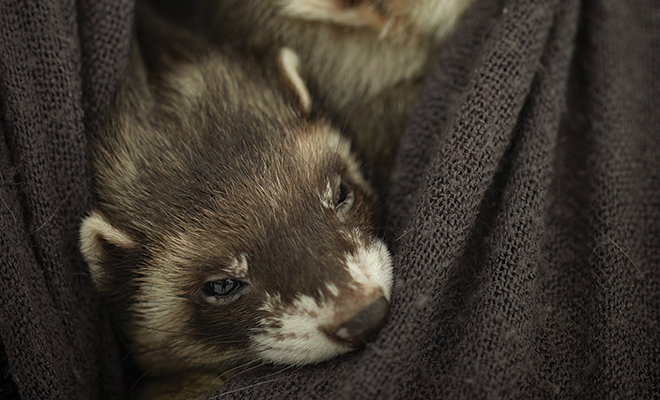
There’s a Ferret in the House!
Approximately 500,000 ferrets are kept as pets in 326,000 households in the United States, placing them at number ten on America’s list of most popular pets. They are cute, curious and cuddly; they are mischievous, fearless and a nuisance at times!
For over 2,000 years, ferrets have been domesticated and used in rodent control. Domesticated ferrets come from either the European common ferret (Mustela putorius furo) or the black-footed ferret of the U.S. western plains (M. nigripes). They are members of the weasel family (Mustelidae) along with badgers, otters, weasels, minks and wolverines.
Ferrets are relatively easy to care for. Since ferrets are carnivores, their diets must consist of animal protein, not plant-based products. They eat kibble like dogs and cat, but you need to be careful when selecting ferret food, as not all manufacturers observe healthy practices. A good ferret diet consists of 36 percent protein, about 20 percent fats and is low in carbs, according to the American Ferret Association. Ferrets can be trained to use puppy pads like, well, puppies.
Like most animals, ferrets need their annual shots and checkups. Since not all vets treat ferrets, check with your pet dealer and locate a vet before you need her. Ferrets live for about five to seven years and are susceptible to many illnesses such as rabies, distemper, heart disease, cancer and parasites. Still, with responsible care, many ferrets may live longer in captivity.
Ferrets like to play with their owners. They love games of chase and tug-of-war. Nothing is safe from them. They are fierce and will tackle even an iRobot that is invading their space. Vacuuming might have to be put on hold for a while as this mighty warrior of 2.0 pounds can wrestle a robotic vacuum cleaner to the draw. Other ferrets will adopt the machine as their ride and go for a spin.
One of the ferret’s favorite toys is a tube with a diameter wide enough to turn around in. To make your ferret really happy, connect various tubes all around their play area. Balls of various types are another popular toy. As you select your ferret’s toys, avoid rubber, foam and plastic objects as bits of these materials can cause intestinal obstruction in ferrets.
Ferrets will play hide-and-seek ad nauseam; they hide your objects and you seek them, earning them the nickname of thieves in some cultures. Car keys, earrings, socks, wallets, passports, you name it and they’ll try to carry it to their stash. A clever way to learn where they have their stash is to give them a new toy and see where they take it.
Ferrets are mighty climbers and jumpers. More than one owner has discovered their ferret has learned how to open the door to their kitchen cabinets, explored the innards of these cabinets, and found a nesting place on top of the silverware in the silverware drawer.
Ferrets go into a dead sleep when they are tired. Nothing will wake them—not yelling, not poking and not holding them. After being active for many minutes, it is not unusual at all for ferrets to fall asleep, right where they are and play dead. They are fine, but more than one new owner has had the scare of their life as their new pet will not rouse for anything and appears dead. It appears that this is harmless to the pet, and while it scares the new owner beyond belief, the ferret will pop up ready to play when he has had enough rest. The need for up to 18 hours sleep makes the ferret an ideal pet for owners who are at work or school all day and need a pet that doesn’t demand excessive attention during the hours the owner is otherwise engaged.
Your ferret has a full range of vocalizations that he uses to express himself. The dook, a chortle or chuckle, is used to express happiness or excitement when exploring or playing. A hiss means leave me alone, frustration or anger. A scream indicates that the ferret is startled, frightened or in pain. Continued screaming may mean that the ferret needs medical attention. A bark is used as a defense when a ferret is frightened or very excited. Owners usually learn to distinguish between happy noises and angry or frightened ones.
Ferrets are probably not a good choice for families that have small children or babies because they are a delicate animal that children might drop. Also, there are cases of babies being attacked by ferrets. Still, if you are looking for an exotic pet and are willing to put in the time to properly care for them, a ferret, or two, or three may be the ideal pet for you.
Sources: ferret.org, livescience.com, be.chewy.com, ncbi.nlm.nih.gov, avma.org, britannica.com and ferret-world.com.







